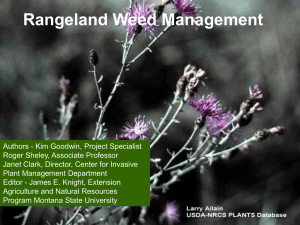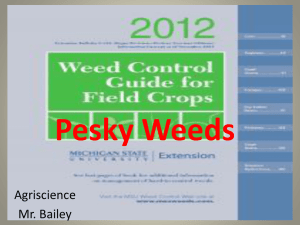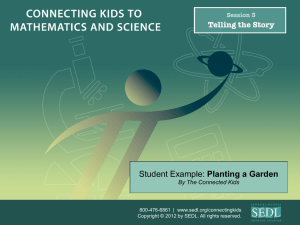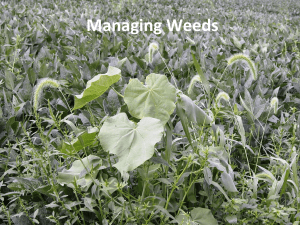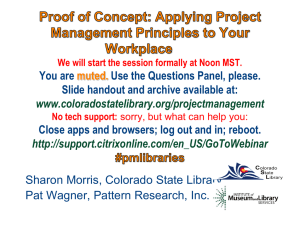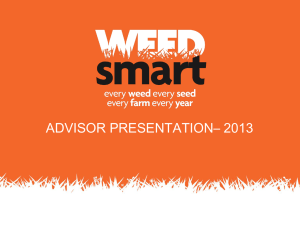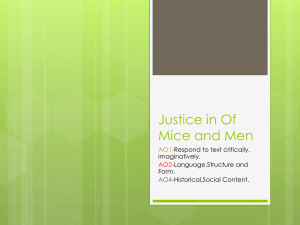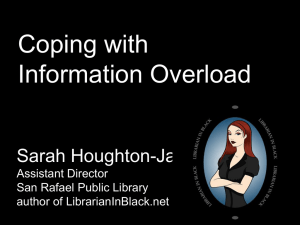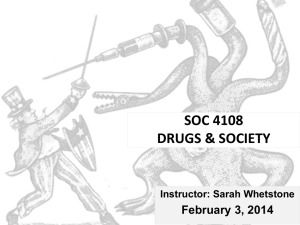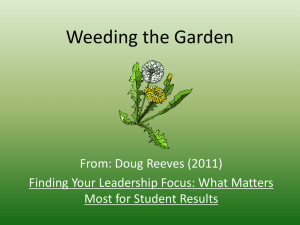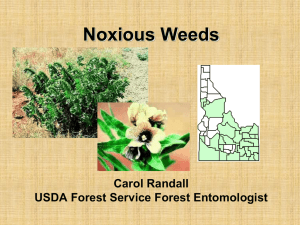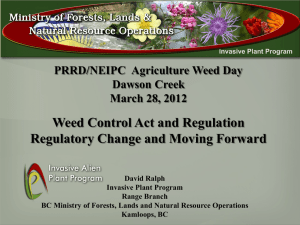Scientific Method Review
advertisement
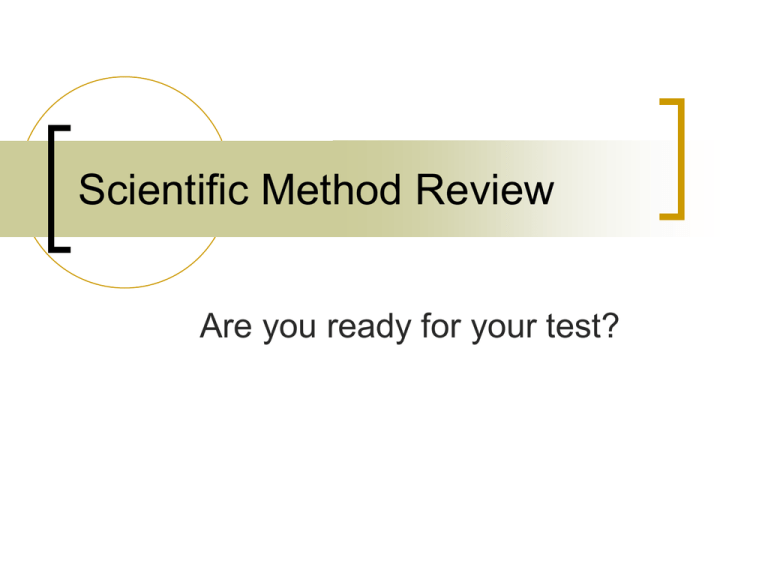
Scientific Method Review Are you ready for your test? Q1 The step of the Scientific Method that is in a question format. Answer: PROBLEM Q2 A testable statement in the scientific method Answer: HYPOTHESIS Q3 The part of the scientific method that allows us to test the hypothesis. Answer: EXPERIMENT Q4 The group that the experiment is performed on. Answer: EXPERIMENTAL GROUP Q5 The group that the results are compared to and it receives no experimental treatment. Answer: CONTROL GROUP Q6 The variable changed by the scientist and it is what the scientist is testing in the experiment. Answer: INDEPENDENT VARIABLE Q7 Data used to make graphs, gained from counts or measurements and it is numerical. Answer: QUANTITATIVE DATA Q8 The variable that is measured or observed throughout the experiment. Answer: DEPENDENT VARIABLE Q9 The axis where the independent variable is placed. Answer: X-AXIS Q10 A concise statement above the graph that tells the reader what the graph is about. Answer: TITLE Q11 Should include all data points and climb in intervals such as multiples of 2, 5, 10, etc. Answer: SCALE Q12 The axis where the dependent variable is located. Answer: Y-AXIS Q13 A short description concerning the graph’s data. Answer: LEGEND Q14 The type of graph that best shows the relationship between two variables. The data is continuous. Answer: LINE GRAPH Q15 Type of graph that has labels rather than numbers on the x-axis. The data is not continuous. Answer: BAR GRAPH Q16 A graphs that shows the data as a percentage in relation to the total data. Answer: CIRCLE GRAPH Q17 The part of a lab report contains the title of the experiment, your name, all of your lab partner’s names, experiment dates, class and hour. Answer: TITLE/COVER PAGE Q18 This section of the lab report contains the independent variable, dependent variable, and controls. Answer: EXPERIMENTAL DESIGN Q19 The section of the lab report explains any mistakes you made during the lab. Answer: SOURCES OF ERROR Q20 This section of the lab report tells what happened in the lab and why. Answer: ANALYSIS Q21 The section of the lab report where you reject or accept your hypothesis. Answer: CONCLUSION Q22 Mr. Orange, Mr. Blue, and Mrs. Purple all had weeds growing in their yards. Mr. Orange does nothing about his weeds. Mr. Blue applies weed killer X. Mrs. Purple applies weed killer T. What is a good problem for this scenario? Answer: WHICH WEED KILLER IS GOING TO KILL THE MOST WEEDS? Q22 Based on the weeds scenario, what is the hypothesis? Answer: IF BRAND X WEED KILLER IS APPLIED TO A LAWN THEN IT WILL HAVE LESS WEEDS THAN A LAWN TREATED WITH BRAND T WEED KILLER Q24 What is the control group in the weed killer experiment? Answer: MR. ORANGE’S LAWN WITH NOTHING APPLIED Q25 What is the experimental group in the weed killer experiment? Answer: MR. BLUE’S LAWN & MRS. PURPLE’S LAWN BECAUSE THEY BOTH HAD SOME SORT OF WEED KILLER Q26 What is the independent variable in the weed killer experiment? Answer: THE WEED KILLER BRAND X OR T Q27 What is the dependent variable in the weed killer experiment? Answer: THE AMOUNT OF WEED KILLER IN EACH LAWN Q28 Is the weed killer experiment done in a controlled environment? Answer: NO, BECAUSE IT IS OUTSIDE, NOT IN A LAB Q29 The common steps that biologists and other scientists use to gather information and answer questions. Answer: SCIENTIFIC METHOD Q30 Jack and Jill collected the following data: green, strong, dark, and many ears of corn. What kind of data is this? Answer: QUALITATIVE Q31 Name the Safety Symbol Q32 What is the correct format for a hypothesis? If, then (and a prediction) Q33 If students prefer French fries to tater tots then they will eat 10% more each lunch. What is the independent variable? Type of potato Q34 If students prefer French fries to tater tots then they will eat 10% more each lunch. What is the dependant variable? Amount consumed Q35 What units does a triple beam balance use to measure mass? grams Q36 What units is temperature measured in for science? Degrees Celsius Q37 What is unit of measurement for volume? mL Q38 What are the best units to measure diameter of a penny? mm Q39 What is the purpose of a graduated cylinder? Measure/transfer the volume of a liquid Q40 What is this a picture of? Erlenmeyer Q41 What is this a picture of? beaker Q42 What does this measure? mass Q43 What were the three safety precautions for the blue lab? Eye safety (goggles) Clothing protection (aprons) Chemical (careful of spills) Q44 In the Blue lab why did the liquid change to blue only when half the flask was full? Air/oxygen Q45 What were you trying to determine during the blue lab? (What was the problem?) Are liquids A and B the same? Q46 While conducting the blue lab why did you perform three trials for each flask in experiment 3? More valid/reliable Q47 Was the liquid in flask A the same as the liquid in flask B? yes Q48 Is it okay to taste a sample of table sugar used in a lab experiment? no Q49 When is it okay to work alone in the lab? Never Q50 Where do you put broken glassware? In the properly labeled disposal designated for broken glass (Bob in Mrs. Gaines’ class) Q51 What should you do in the event of a chemical spill? 1st tell teacher Only if instructed, clean it up Wash your hands Q52 What should you do before the lab begins? Read instructions/lab/procedure Listen for special instructions Wash your hands Get equipment Q53 What should you do when the lab is over? Clean up Wash hands Q54 Why is horse-play unacceptable in the lab? Dangerous/unsafe for self and other students (someone could get hurt) Q55 How should you pick up a beaker of boiling liquid? Hot pads/tongs Q56 Al Kane was mixing two chemicals in a beaker. He noticed that a greenishyellow gas was bubbling out of the liquids. He had been told to make all observations that he could, so he held the beaker close to his nose and took a good whiff. Q57 Sally Forth was told to make observations about some liquids. One of the liquids was supposed to be a base and therefore have a slippery feel. So she carefully dipped the end of her little finger into each liquid and rubbed her thumb on the wet skin. Q58 Messy Slob was usually the slowest person in the lab. She did everything so carefully that she seldom finished all of the procedure before it was time to clean up. On this particular day, Messy was so worried about not being late to her next class that even though she knocked over a beaker of liquid, she just left it and raced out of the lab. Q59 Notta Clue and his partner Spacey Cadet were going to do a lab in their science class. As usual, they were late to class and all of the other students were already in the lab. “What are we supposed to be doin’ ?” asked Notta. “I don’t know,” replied Spacey. “Let’s just do what everyone else is doing!” Q60 “We took too much of these chemicals,” said Hal Ogen to his partner Nob Legas. “Take the beakers up to the counter and pour the powders back into the bottles.” Q61 Bob really liked Sally and was really pleased she was in his class. “I’ll have a chance to talk to her and ask her out,” he thought. “But she won’t even talk to me if I wear these dorky safety glasses and apron.” ANY QUESTIONS??? GOOD LUCK STUDY HARD!!
